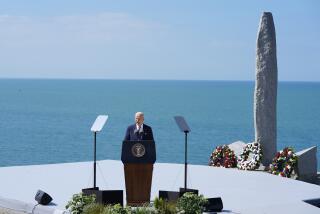Meager Demands on Willing Patriots
- Share via
WASHINGTON — In the weeks since the Sept. 11 assault on American identity, we have witnessed an incredible spontaneous outpouring of patriotism. It has been manifested in offerings of blood, rescue work, food and supplies, consolation for the bereaved and a general reaching out to one another. Enlistments in AmeriCorps, the national community service program, have been on the rise since Sept. 11.
In wartime, we rally around the president, awaiting his signal for what burdens we must bear to vanquish the foe. That signal has not yet come.
I can remember President Franklin D. Roosevelt’s “Call to Sacrifice” speech in April 1942. It summoned Americans on the “home front” to accept a denial of creature comforts. Americans accepted, cheerfully for the most part, rationing of gasoline and meat, wage and price controls, and the duty to collect tin cans.
In the Korean War, President Harry S. Truman announced a re-imposition of wage and price controls and a steep increase in defense spending. He admonished every citizen to “put aside personal interests for the good of the country.”
In another kind of war, the Cold War with the Soviet Union, President John F. Kennedy, who had paid his dues as a PT-boat commander in World War II, called on Americans in his 1961 inaugural address to “pay any price, bear any burden, meet any hardship” in the defense of liberty.
President Lyndon B. Johnson, unsure of citizen support for the Vietnam War, promised both guns and butter and said he saw no reason to declare a national emergency. He called for no sacrifice, although he exacted one in higher taxes from a people generally turned off to the war.
President Bush has been reluctant to ride the wave of patriotism with a call for subordinating personal, class and group interests to national interest. The message he has conveyed to the “home front,” which is not a phrase he would use, is that Americans should confound the terrorists with their normalcy.
In his Sept. 20 address to Congress, the president said, “Americans are asking, ‘What is expected of us?’ I ask you to live your lives and hug your children.” At his Oct. 11 news conference, the president was asked why he has not called for sacrifice from the American people. He gave a confusing answer, noting that Americans are already sacrificing by, for example, having to wait in long lines at airports.
At a time when the federal government is being called upon to secure the public health against bioterrorism and bail out industries harmed by the Sept. 11 terrorist attacks, President Bush told senior civil servants on Oct. 15, “We must resist pressure to unwisely expand government.”
Will Americans be content to express their patriotism in a splurge of consumerism and Disneyland vacations? I doubt it. Nor will they long abide the exploitation of patriotism to serve narrow interests.
Congressional fund-raisers have started substituting patriotic appeals for partisan attacks in their mailings. The Senate Finance Committee is considering a 100% tax deduction for business meals with cocktails as a patriotic pump-primer for the economy. The administration calls its surveillance-expansion bill the “PATRIOT Act.” (Provide Appropriate Tools Required to Intercept and Obstruct Terrorism. Get it?)
What is needed, before the wave of spontaneous patriotism dribbles away in special pleading, is for the president to declare a larger purpose that will give our patriotism something to latch onto. That would involve saying that the government will bail out not only hurting industries, but also hurting people. It would mean saying that tax cuts will be put on hold and huge tax increases--bearing most heavily on the rich--will be needed to pay for public safety and public health and for rebuilding our stricken cities and damaged economy.
Here is a line Bush might use:
“Here at home everyone will have the privilege of making whatever self-denial is necessary, not only to supply our fighting men, but to keep the economic structure of our country fortified and secure during the war and after the war.”
It comes from FDR’s “Call to Sacrifice” in 1942.
More to Read
Sign up for Essential California
The most important California stories and recommendations in your inbox every morning.
You may occasionally receive promotional content from the Los Angeles Times.










